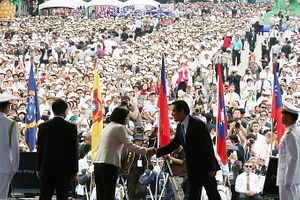In mainland China, if you don’t get married by the age of 27 you are relegated to the “leftover women” bin, but in Taiwan things look a little different. An unmarried woman with aboriginal roots became, on May 20, the first female president of the Republic of China, better known as Taiwan. Her name is Tsai Ing-wen and her election to Taiwan’s highest office was a landmark not only for Taiwanese politics, but also for the entire Asian region.
Tsai was not a new figure on Taiwan’s political stage, having been the Democratic Progressive Party (DPP) candidate in the presidential election of 2012, but she was the revelation of this year’s presidential race. Without inheriting an important name and without having a political pedigree, she succeeded in becoming the elected leader of Taiwan. Tsai is a single woman who thrived in a world ruled by men and filled with stereotypes, without belonging to a political dynasty – in comparison to previous female leaders in Asia.
Although the popular narrative about her election emphasizes that she is a woman with aboriginal origins and a leader who will adopt a different stance toward China, not many voices focused on the most relevant aspect of her peculiar achievement: she is the only Asian woman to take the reins of power without being related to a former male political figure or head of state. Tsai won a democratic election without inheriting a political dowry as Aung San Suu Kyi, Sheikh Hasina, or Park Geun-hye did.
Asia’s political dynasties are woven all around the region, from Pakistan to South Korea, from India to the Philippines. These political dynasties coagulated around important male figures, transformed into modern versions of medieval houses: Nehru-Gandhi, Aquino, Bhutto, Bandaranaike, Sukarno, to only name a few. The source of these families’ power rests on three main pillars: name recognition, networking, and the martyred story of a male family member. Enabled by these three assets, a generation of female leaders in Asia has been propelled to the highest level of political power, always through democratic means, by popular sympathy for the tragic death or exile of a male relative who used to lead the state.
Aung San Suu Kyi, the quintessential symbol of democracy and political struggle in Asia, was not on her own in Myanmar, but was elevated by her father’s renown. Major General Aung San, dubbed as the ‘Father of the Nation of Myanmar,’ was assassinated shortly before his country’s independence. Suu Kyi is not the only offspring of a great political figure who was helped by her father’s prestige. Park Geun-hye, the current president of South Korea, also has political roots that lead to General Park Chung-hee, who ruled South Korea from 1961 until his assassination in 1979. Sheikh Hasina, another Iron Lady of Asia and the prime minister of Bangladesh, draws her power from her father’s name as well. Sheikh Mujibur Rahman was the founding leader and the first president of Bangladesh and his tragic death, assassinated together with most of his family during a military coup, spawned a wave of sympathy that two decades later brought his daughter, Hasina, to power.
Asia has seen other former female leaders whose positions of power benefited from their family’s recognition: Benazir Bhutto, the ex-prime minister of Pakistan; Khaleda Zia, the rival of Sheikh Hasina and a former prime minister of Bangladesh; Sirimavo Bandaranaike and her daughter Chandrika Kumaratunga in Sri Lanka; Megawati Sukarnoputri, an ex-president of Indonesia; Yingluck Shinawatra, former prime minister of Thailand; and Corazon Aquino and Gloria Macapagal Arroyo – both presidents of the Philippines. There is another important female political figure on the Indian political stage: Sonia Gandhi. Sonia is the leader of the main Indian opposition party, the Indian National Congress, and the daughter-in-law of another towering woman of Asia: Indira Gandhi – former prime minister and the daughter of India’s first prime minister, Jawaharlal Nehru. Sonia Gandhi’s husband, Rajiv, was assassinated while campaigning in order to regain his position as prime minister of India; Indira was also assassinated, in 1984.
All these Iron Ladies of Asia epitomize the hybridization of democracy and dynastic power rooted a family’s name recognition and its networks. Almost every Asian country has an important leading family that transmits power successively, over many decades. The formation, existence, and survival of the political dynasties are enabled by a combination of nostalgia, name recognition, and poor education.
In fact, political dynasties aren’t endemic to Asia, although this region is the most representative. There are political dynasties all around the globe, including in the United States, where the political dynasty debate is timelier than ever with Hillary Clinton running for the presidency.
So, while Asia has had numerous female leaders throughout the past decades, Tsai Ing-wen is the first woman to break the pattern of dynastic lineages, being elected without the benefit of a famous name.
Each election of a female leader from an Asian political dynasty has only a short-lived effect on the state of democracy and of women’s rights. The elections did not stem from a woman’s personal charisma and her achievements, but from a former leader’s name recognition and network; as such, the election of female leaders it may be an ephemeral breakthrough for women’s rights and even, in some cases, a degradation of democracy.
For all these reasons, the election and inauguration of Tsai Ing-wen must be applauded, because it engenders hope for the dawn of greater gender equality in the whole of Asia.
Andreea Brînză is a researcher at The Romanian Institute for the Study of the Asia-Pacific (RISAP), where she analyses geopolitical trends in Asia, with a special focus on China.
































